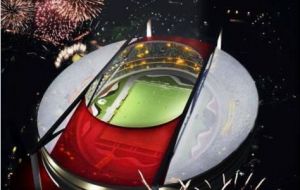MercoPress. South Atlantic News Agency
Brazil says stadiums will be ready on time for the 2014 World Cup
 Work at Sao Paulo’s Morumbi that will host the opening match has only began
Work at Sao Paulo’s Morumbi that will host the opening match has only began Brazilian President Dilma Rousseff on Thursday brushed aside concerns over delays in preparations for the 2014 World Cup, insisting that all stadiums would be ready in time for the tournament.
Practically all the works which were to have been carried out in the 12 stadiums across Brazil have run into delays, with some struggling to meet FIFA construction deadlines.
But Rousseff insisted: “We have stadiums which are still being built and these must be ready by December 2013 to be in an extremely calm and comfortable situation. There are others which are a little more delayed but all will be ready.
”I feel confident that Brazil will be ready in 2014 to present the best World Cup. We (the government) together with the governors and the mayors of the cities of the World Cup are taking all necessary measures to ensure that this will happen.”
The Confederations Cup takes place in Brazil in June 2013 and will act as a warm-up for the World Cup requiring that most of the infrastructure for 2014 be in place.
FIFA had expressed their concern over delays but gave the organisers a vote of confidence at the end of June, after the previous month announcing that two stadiums, Sao Paulo and Natal, would not be ready to host Confederations Cup matches.
Work has recently begun on the Sao Paulo stadium which will host the opening World Cup games but building has not started at Natal Stadium in the north east of the country.
As well as sporting infrastructure, Brazil will need to spend over 11.4 billion dollars on improving roads, hotels, security, and telecommunication network and airport capacity.




Top Comments
Disclaimer & comment rules-

-

Read all commentsIf England is going to win it,
Aug 12th, 2011 - 10:31 am 0we will need a new stadium, lol.
Available money for stadium build and associated transportation infrastructure - Obama loans makes this not the issue.
Aug 12th, 2011 - 12:40 pm 0Some key issues are
the available skilled workforce in the right places for the right duration,
the planning,
project management,
the planning constraints & permissions, and of course,
the making sure 100% of the funds get spent on the projects and are not diverted into pockets.
It will happen, it will look good on TV,
but many infrastructure opportunities - especially in the quality of build because of collapsing time-frames - are being lost all down the line and in all parts of the country.
Commenting for this story is now closed.
If you have a Facebook account, become a fan and comment on our Facebook Page!